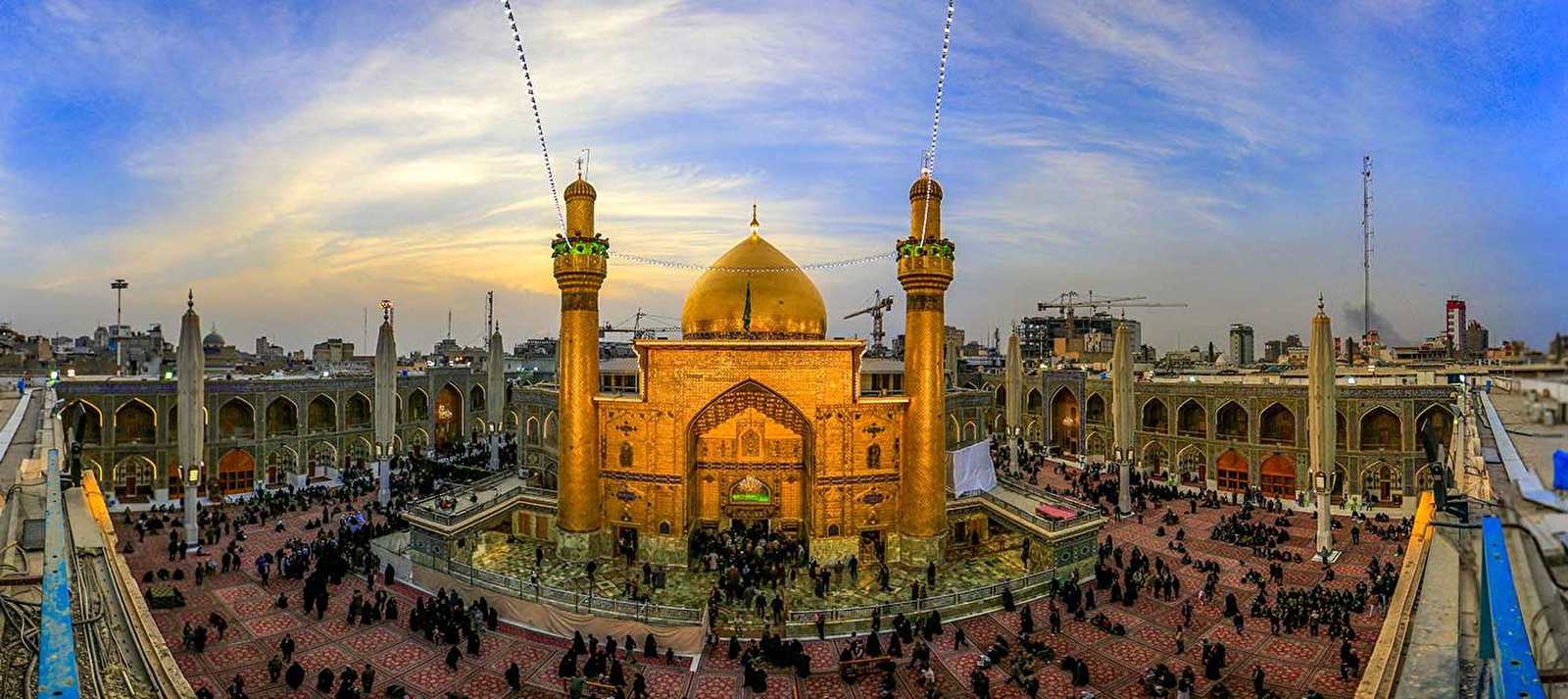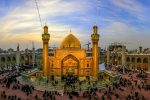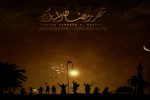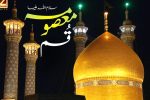Imam Ali (A.S.), the First Compiler of the Holy Qur’an
The above hadith found in several authoritative works of almost all denominations of Islam, is not a stray or solitary reference to the relationship between the Holy Qur’an and its prime and perfect compiler as a mushaf (book) in the correct order of revelation, especially when one takes note of the widely-quoted Hadith al-Thaqalayn […]
The above hadith found in several authoritative works of almost all denominations of Islam, is not a stray or solitary reference to the relationship between the Holy Qur’an and its prime and perfect compiler as a mushaf (book) in the correct order of revelation, especially when one takes note of the widely-quoted Hadith al-Thaqalayn which the Prophet pronounced on several occasions concerning the legacy that he was leaving behind and the inseparability between the Book of Allah and his Ahl al-Bayt, whose most senior member was his cousin and son-in-law, Imam ‘Ali bin Abi Talib (A.S.). In addition, the Prophet’s explicit explanation of certain ayahs of the Holy Book, such as “… say: sufficient is Allah as witness between me and you and he with whom is the knowledge of the Book” (13:43). that the witness other than God referred here, is Imam ‘Ali (A.S.),(2) is further proof of the fact that it was but natural for the Qur’an to be collected between two covers by the person who for twenty-there years had been the sole human witness to the revelation of the Divine Message to the Seal of Messengers (S.A.W.).
All early sources of Islamic hadith and history have vouched the veracity of the words of Imam ‘Ali (A.S.)- expressed on several occasions – that from among the Prophet’s companions, other than him, no one was more knowledgeable of the Qur’an between the two covers, and in addition to the nasikh wa mansukh (abrogator and the abrogated), the muhkam wa mutashabih (clear and allegorical), and the khass wa ‘amm (specific and general), he knew every single Qur’anic ayah, regarding whom it was revealed and where it was revealed, whether in the plain or on the mountain, in daytime or at night. He not only had committed to memory the entire Qur’an but as the person most nearest to the Prophet, had also transcribed on parchment, leaf, cloth and papyrus whatever his cousin dictated, in addition to the sacred text.
Thus, it is clear that he possessed every single revelation and it was only a matter of time for him to give these fragmented folios the form of book (mushaf). This opportunity came to him after the passing away of the Prophet and his isolation by the conspirators who staged a coup at Saqifah Bani Sa’idah while he performed the last rites of the Divine Messenger.
Reports on Compilation of the Imam’s Mushaf
There are numerous reports in both Sunni and Shi’ite texts that Imam ‘Ali (A.S.) was the first-ever compiler of the Holy Qur’an as well as the manner of compilation of his mushaf. According to the prominent tabi’i, Muhammad bin Sirin (33-110 AH), the Imam’s mushaf was in the order of revelation with due focus on ayahs pertaining to nasikh and mansukh. Ibn Sirin says that when Imam ‘Ali (A.S.) stayed away from the new rulers and did not give allegiance to Abu Bakr, the latter felt concerned and visited his house to ask him the reason for not acknowledging his caliphate. The Imam replied that he had pledged to Allah not to put a cloak on his shoulders except for the prayer until he complied the Qur’an between two covers (mushaf). Ibn Sirin regretted that this transcript has not passed into the hands of the Muslims (for reasons which will be mentioned later) and said: “If that transcript were in our hands, we would have found great knowledge in it.”(3) A similar report has been given by Ibn Munadi, who says that after the passing away of the Prophet, the Imam confined himself to his house for three days and compiled the whole Qur’an. The famous bibliographer, Ibn Nadim, has called it the first ever mushaf and said the Imam compiled it with the help of his heart and memory.(4) Ibn Jawzi al-Kalbi reports that during the lifetime of the Prophet, the Qur’an was in fragmented form, confined to parchments and the memory of reciters, until compiled as mushaf in the order of revelation by Imam ‘Ali (A.S.) immediately after the passing away of the Noble Messenger. He says that if this mushaf were to be traced it would unravel bezels of wisdom.(5)
Unfortunately, certain persons, while acknowledging the authenticity of these accounts have tried to cast doubts on the Imam’s compilation being in book-form, by stating, rather unconvincingly, that the phrase jama’a al-Qur’an means that he memorized the Holy Scripture after the passing away of the crude attempt to credit others with the first compilation of the Qur’an but the fallacy of such biased claims are exposed when we diligently scrutinize the text of the above-quoted accounts where the word mushaf is clearly mentioned. Moreover, only a written or transcribed document could be the quest of scholars who regret at not having access to it, and not the memory of a person. ‘Allamah Majlisi in his note to the queries and answers given by the celebrated Shaykh Mufid in al-Masa’il al-Sarwiyyah, writes:
The commander of the Faithful, Imam ‘Ali (A.S.) compiled the whole Qur’an from its beginning to its end and arranged it in order (of revelation) with the Makkan ayahs taking precedence over those revealed later in Madinah and placing the abrogated before the abrogator; everything in the Qur’an being in its right place. For this reason Imam Ja’far al-Sadiq (A.S.) has said: “Yes, by Allah! If the Qur’an is to be recited as per its order of revelation, you will find us in it with names and references in the same manner as those before us have been mentioned by name.(6)
Al-Shahristani’s Report on Mushaf Imam ‘Ali (A.S.)
‘Abd al-Karim al-Shahristani (d. 548 AH) in his exegesis of the Holy Qur’an, pointing to the confused statements of the days of ‘Uthman concerning the compilation of the Book of Allah, says: “Ignoring these statement we should study why (Imam) ‘Ali bin Abi Talib (A.S.) was not approached for compilation of the Qur’an? Was he not a greater authority than Zayd bin Thabit in transcribing the Qur’an (as well as its memorization and familiarity with its contents)? Did him not posses a better knowledge of Arabic and its grammar than Sa’id bin ‘As? Was not (Imam) ‘Ali bin Abi Talib (A.S.) considered closer to the Messenger of Allah (S.A.W.) than any of the sahabah?
The answers are obvious, he says, and regrets that the sahabah ignored the realities with the majority of them showing indifference to the compilation of the Qur’an by Imam ‘Ali (A.S.) and almost ostracizing him. After discharging the funeral rites of the Prophet, the Imam pledged not to put the cloak on his shoulders until he had fulfilled his duty of compiling the Qur’an. He compiled the Qur’an as per the sequence of its revelation in the correct order of arrangement shown to him by the Prophet, without the least distortion, deletion or addition of words.
Al-Shahristani writes that this firs-ever mushaf, in addition to the text of the Holy Qur’an, contained comments and explanatory notes by Imam ‘Ali (A.S.) as well as parenthetical sentences on the margin in relation to specific phrases. He says that when Imam ‘Ali (A.S.) completed the compilation of the Qur’an, he took the mushaf, along with his slave Qanbar, to the people (Abu Bakr and his companions) assembled in the Prophet’s Mosque. It is reported that the mushaf was equal to a camel-load. The Imam told the gathering:
“This is the Book of Allah as it was revealed to Prophet Muhammad (S.A.W.). I have collected it between two covers.” The caliph and his courtiers replied: “Take away your mushaf we do not require it.” The Imam told them: “By Allah! After this you will never see it again. I only felt it my duty to inform you that I have compiled it.”
The Imam returned to his house reciting the following ayah of the Holy Qur’an: “O’ my Lord! Verily my people have held this Qur’an as a vain forsaken thing.” (25:30)
He had no other choice but to leave the people to their own fate in the same manner that Aaron, after completing his argumentation, left the rebellious ummah of Prophet Moses (A.S.) to its fate and apologized to his brother in the following word: “…I was afraid lest you say: You have caused division among the Children of Israel and did not respect my word.” (20:94) Imam ‘Ali (A.S.) also recited the ayah: “… he (Aaron) said: O’ son of my mother, verily the people did reckon me weak and had well nigh slain me, so make not (my) enemies rejoice over me, and count me not among the unjust people.”(7:150)
The Imam had thus fulfilled his responsibility to the ummah, whether or not they heed his words. In order to save Muslims from fragmentation and divisive tendencies, it was essential for the Qur’an to be compiled between two covers from the hitherto fragmented state of surahs inscribed on parchments, on shoulder bones of camels, on leafs and in the minds of some who had memorized a few parts.
“(O People
Follow what has been sent down unto you from your Lord, and follow you not (any) other than Him, as (your) guardians; how little do you mind.” (7:3)
Imam ‘Ali (A.S.)by virtue of his position to the Prophet had shown people the correct way of preserving the sacred text as it was revealed, but the group rejected it. When years later, they felt the necessity of a mushaf to serve as a standard book, the people entrusted with the compilation of the Qur’an again made the folly of ignoring him despite the explicit instructions of the Prophet that his Ahl al-Bayt are one of the two invaluable things as mentioned by Hadith al-Thaqalayn:
I am leaving behind among you the thaqalayn (two invaluable things), the Book of Allah (Qur’an) and my progeny (my Ahl al-Bayt). Hold fast to them and you will never go astray, for these two will not part with each even when they return to me at the pool.(7)
After focusing on these facts, al-Shahristani says: “Yes, by Allah, the Qur’an is certainly safe from any kind of interpolation, whether omission or addition, as promised by the Almighty: “Surely, We have sent down the Reminder (the Qur’an), and surely We (Ourselves) will be Guardians over it. (15:9) It is only through the endeavours of the Ahl al-Bayt the Qur’an has been protected and preserved since the two are inextricably inseparable and compliment each other by way of their discourse: “And indeed We caused the word (of guidance) to come unto them continuously…” (28:51) The bond between the thaqalayn and their indivisible cohesion (e.g. expounding the timeless wisdom of the Qur’an and the correct way of recital as shown by the Ahl al-Bayt) is borne out by Allah’s words: “Certainly, on Us is the collection of it (Qur’an) and the recital of it!” (75:17) Therefore, if the mushaf of (Imam) be to Allah, it is safe with another group; hidden and concealed: “Nay! It is Qur’an the Glorious (inscribed) in the Guarded Tablet (Lawh Mahfuz).” (85:21 & 22) (8)
Al-Shahristani then goes on to note a very vital point. He says Imam ‘Ali (A.S.) in contrast to the attitude of the sahabah towards the mushaf he had compiled after the passing away of the Prophet – did not reject the Qur’an collected by the sahabah. Neither did he pass comments like Uthman, who said concerning the Qur’an: ara fihi lahnan wa sataqayyamuhu al-‘Arab (I see grammatical mistakes in it which the Arabs will rectify). Nor did he express an irresponsible remark such as the one attributed to ‘Abdullah bin ‘Abbas inna al-Katib katabahu wa huwa na’is (the scribe wrote it [Qur’an] in the state of stupor). In fact, Imam ‘Ali (A.S.) recited what had been compiled by others as the single codex and also copied it in his handwriting. Likewise, his descendants, the Imams of the Ahl al-Bayt, recited the one and only mushaf that was in circulation among the Muslims, and taught it to their children. The Almighty is too Wise and Glorious to let grammatical mistakes and errors creep into His Final Revelation to mankind and leave it to the Arabs to correct it later on.
“Nay! They (angels) are (His) honoured servants. They speak not before He speaks, and they act on His bidding.” (21:26 & 27)
As al-Shahristani argues it is not unlikely that concerning the copying of the Revealed Qur’an there were two manuscripts that were not different, and since these two were not in contradiction to each other they were considered the Word of Allah. Neither does it mean that Prophet Moses (A.S.) had written the Torah in his own handwriting. There is a hadith regarding the special manuscript of the Torah, as recorded and preserved in the Tablets, that was in the safe custody of the righteous descendants of Aaron. Even though the interpolation of the Torah by the Jews distorted its contents, nevertheless it cannot be construed of losing the honour of containing the Word of God. We see in the Qur’an how Allah has mentioned the Torah in estimation and reminds us that: “…therein (in the Torah) was guidance and light; with it judged (Our) apostles…” (5:44)
Likewise, the Evangel could also be considered a Book of Allah. Its four different copies currently in circulation among the Christians were reportedly written or compiled by four of the disciples of Prophet Jesus (‘a). There are numerous and major differences in these four books. Of course, we cannot consider them collectively as the Word of Allah made manifest through revelation. But these gospels could be likened to parts of the Qur’an commented upon by exegetes in their exegesis later on. Accordingly, the gospels attributed to St. John, St. Mark, St. Luke and St. Matthew could be called commentaries on the original Evangel revealed to Prophet Jesus (‘a), regarding whom God says in the Holy Qur’an: “… and (I come) confirming that which is before me of the Torah…” (3:50). The Qur’an also says: “…confirming what was before it; and He sent down the Torah and the Evangel…” (3:3)
Thus the Qur’an in circulation among Muslims is the Divine Word between two covers protected by God from errors, faults, changes and metamorphosis. Neither the scribe was lethargic and overcome be drowsiness when writing it down, nor did the reciter (the Prophet) committed grammatical errors and solecism while pronouncing its divine contents as alleged. The people who recite the Qur’an diligently observe whatever is right and advisable, and their discernment between revelation and interpretation, has kept it safe from any errors and distortion. “…while no one knows its interpretation except God and those firmly rooted in knowledge; they say: ‘We believe in it, all of it is from our Lord,’ and none takes Reed except those who possess acumen.” (3:7) (9)
Al-Shahristani’s critique by raising these questions and providing answers to them, proves beyond doubt that Imam ‘Ali (A.S.) accomplished the invaluable work of compiling the Qur’an in view of his profound familiarity with its contents and his unrivalled proximity of relationship with Prophet Muhammad (S.A.W.). The deliberate rejection of Imam ‘Ali’s (A.S.) mushaf by the sahabah has been severely censured by al-Shahristani. It pains his heart like a prickly thorn, bringing clear complaints on his lips as how this mushaf was collectively rejected by the Prophet’s companions.(10) When Imam ‘Ali (A.S.) brought his compilation of the Qur’an and placed it before the sahabah, ‘Umar bin al-Khattab who was later to direct efforts to compile the Qur’an during the caliphate of Abu Bakr, told him bluntly: “ma aghnana bima ma’ ana min al-Qur’an ‘amma nad’una ilayh (does not the [parts of] Qur’an which we have sufficient for us from what [your mushaf] you are calling us to).”(11)
Al-Shahristani explicitly states: “The Commander of the Faithful, (Imam) ‘Ali (A.S.), in accordance with the clear instructions of the Prophet, busied himself in the compilation of the Qur’an immediately after performing the last rites of the Messenger of Allah. He completed it without any intermission.”(12) A narration from Imam Ja’far sl-Sadiq (A.S.) as related by Abu Bakr al-Hadhrami says in this regard:
Inna Rasul Allah (S.A.W.) qala li-‘Ali (‘a): “Ya ‘Ali al-Qur’an khalfa firashi fi al-Mushaf wa al-harir wa al-qaratis, fa khudhuhau wa aima’uhu wa la tuzayyi’uhu kama zayya’at al-Yahud al-Tawrah.” Fa-intalaqa ‘Aliyyun fa jamma ‘ahu fi thawb asfar thumma khatam ‘alayh fi baytihi wa qala: “La artadi hatta ajma’uh.” Wa in kana al-rajulu liya ‘tiyahu fa-yakhruja ilayhi bi-ghayr rida’ hatta jama’ah (In fact, the Messenger of Allah (S.A.W.) told (Imam) ‘Ali (A.S.): “O’ ‘Ali, the Qur’an is behind my bed (in and compile it and let it not be lost as the Jews lost the Torah.” (Imam) ‘Ali (A.S.) accordingly gathered it in a yellow garment and bound and sealed it in his house, saying: “I will not put on the cloak (on my shoulders) until I have compiled it.” If anyone called at his door he used to come out and meet him without a cloak, until he had completed the compilation).(13)
Al-Shahristani refers to the Hadith al-Taqalayn concerning the compilation of the Holy Qur’an and stresses the firm bond between the Book of Allah and the Prophet’s progeny, saying the Qur’an has a special relevance to the Ahl al-Bayt and it is they, who are its guardians and protectors.(14)
In fact, from whatever angle we view the Qur’an we feel the need of the Ahl al-Bayt as the final and satisfactory source of authority that cannot be separated from any dimension of the Holy Scripture. When Imam ‘Ali (A.S.) entered the Prophet’s Mosque with the Qur’an, the sahabah asked him what had brought him after the intermission that occurred with the passing away of the Messenger of Allah. The Imam placed before them the Qur’an he had compiled, and reminding them of the Hadith al-Thaqalayn pointed out to them the unbreakable bond between the Book of Allah and the Ahl al-Bayt, by quoting the Prophet’s words: “Inni mukhallif fikum ma in tamaskatum bihi lan-tazillu, Kitab Allah wa ‘Itrati (Indeed I am leaving among you that which well prevent you from going astray if you hold fast to it, the Book of Allah and my posterity).” The Imam added: “wa haha al-Kitab wa ana al-‘Itrah (and this is the Book (of Allah) and I am (of his) posterity.”(15)
At this stage ‘Umar bin al-Khattab got up and said what we with the words that what the sahabah had of the Qur’an was sufficient.(16)
In the accounts narrated from the Ahl al-Bayt we find that this mushaf was a source of concern and anxiety for the sahabah. Imam ‘Ali (A.S.) even received death threats (17) because of its contents which included on the margins the facts of revelation. Al-Shahristani hints in his account that the reason of rejection of the Imam’s mushaf by the sahabah was “it is related by some that in this mushaf, besides the sacred text, there were marginal notes that appeared to be critical.(18)
It is clear that al-Shahristani is trying to divulge the reality, albeit in a cautious way, concerning the remarks of certain persons, who have been identified and exposed in the hadith related from the Ahl al-Bayt. For instance when Talhah asked Imam ‘Ali (A.S.) regarding the mushaf he had shown to the sahabah after the passing away of the Prophet, he replied:
“Ya Talhah inna kulla ayatin anzalah Allah ‘ala Muhammad (S.A.W.) ‘indi bi imla’ Rasul Allah wa khatti yadi hatta arsh al-khadsh (O’ Talhah every ayah that Allah revealed to Muhammad (S.A.W.) is with me in my own handwriting as dictated by the Messenger of Allah (S.A.W.), everything including the expiation for a scratch).” Talhah asked in astonishment: kullu skay’in min saghir aw kabir, aw khass aw ‘amm, kana aw yakunu ila yawn al-qiyamah fahuwa ‘indaka maktub? (Is everything with you in written form, whether small or big, specific or general, what has so far occurred and what will occur till the Day of Resurrection, written with you?). The Imam answered: na’am, wa siwa dhalika, inna Rasul Allah (S.A.W.) asarra ilayya fi marazih miftaha alfi babin min al-‘ilm, yaftahu kullu babin alfa bad, wa law inna al-ummah munzu qabzi Rasul Allah (S.A.W.), attaba ‘uni wa ‘ata’uni la-akatu min fawqihim wa min tahti arjulihim.. (Yes, and in addition, the Messenger of Allah during his sickness opened for me a thousand doors of knowledge, with each door opening up another thousand doors, and if the ummah after the passing away of the Messenger of Allah had followed me and obeyed my instructions they would have been flooded by divine favours from [all directions] above and from beneath).”(19)
Al-Shahristani also confirms these facts and says: “The Commander of the Faithful compiled the Qur’an as it was revealed, without the least distortion or change, as well as addition and omission. As directed by the Messenger of Allah his mushaf covered the order and arrangement of the surahs and ayahs including what should come before or after. According to Abu Hatam, he also placed besides each other, ayahs of similar purport.”(20)
This is also supported by the accounts of prominent scholars of the school of Ahl al-Bayt. Shaykh Mufid states clearly that the Qur’an in circulation among the Muslims is the Revealed Word of God Almighty in its entirety without the least human interference in its contents. Neither has anything been added or deleted from it. ‘Allamah Majlisi writes in this regard:
Imam ‘Ali (A.S.)collected the Qur’an, as it was revealed, from its beginning till end arranged it in order of sequence with the parts revealed during the Makkan period taking precedence over what was revealed in Madinah (after the Prophet’s migration likewise he placed the mansukh before the nasikh with everything in the Qur’an put in its exact place.(21)
As could be deduced from the accounts of the Sunnis and the Shi’ites, the Commander of the Faithful, Imam ‘Ali (‘a), till the end of his life, never again showed to anyone his mushaf which ‘Umar bin al-Khattab and his accomplices had so coldly rejected. The longing of Ibn Sirin for the Imam’s mushaf and his words, “if it could be found it would open up vistas of wisdom,”(22) is a firm testimony to the very first copy of the Qur’an between two covers that had been compiled immediately after the passing away of Prophet Muhammad (S.A.W.). Ibn Sirin adds:
In his mushaf the Commander of the Faithful had specified the naskh and the mansukh but I was unable to trace it despite my profound efforts in this regard including the letter I wrote to Medina (to the Imam’s family).(23)
This statement which may raise questions in minds concerning the compilation of the first ever copy of the Holy Qur’an and its fate after the martyrdom of Imam ‘Ali (‘a), could be satisfactorily answered from the hadith found in the texts of the School of the Ahl al-Bayt. The following is an account on the authority of the Prophet’s esteemed companion, Abu Dharr al-Ghifari:
When ‘Umar (after he became caliph) asked (Imam) ‘Ali (A.S.) for his mushaf so that it could be subjected to review and changes, he said: O Aba al-Hasan, bring the Qur’an that you had brought before Abu Bakr so that we decide about it. (Imam) ‘Ali (A.S.) replied: It is impossible; there is no way to it. I had brought it to Abu Bakr in order to complete my argument upon you so that you will not be able to say on the Day of Resurrection “we had no information about it,” or would make the pretext that “you did not bring it to us.” Certainly the Qur’an which is with me will not be touched by anyone except the pure, the testamentary legatees (awsiya’ pl. of wasi) among my offspring. “Umar said: Is there a specific time for showing it. (Imam) ‘Ali (A.S.) answered: Yes when the Qa’im from my lineage rises, he will reveal it, make mankind follow it and implement the (Prophet’s) sunnah on its basis.(24)
To lend further credence to the fact that it was Imam ‘Ali (A.S.) who compiled the first and foremost mushaf of the Holy Qur’an, the following discourse between the commander of the Faithful and Talha should remove the last lingering doubts in the minds of skeptics:
O Aba al-Hasan, I see your reluctance to answer some queries regarding the mushaf of the Qur’an you had compiled and whether you would like to show it to the people? He replied: O’ Talhah, I have deliberately chosen not to answer your question. You first relate to me whatever has been gathered by ‘Umar and ‘Uthman, whether it is the complete Qur’an or whether (anything) other than divine revelation has found its way in it? Talhah replied: It is the complete Qur’an. The Imam said: If you abide by its contents you are safe from the fire of hell and will be rewarded with the garden of paradise, since the Qur’an contains proofs, arguments and clarifications of our rights and the obligation to follow us. Talha said: This is sufficient for me. The Qur’an suffices me.
Then Talhah said: Now inform me about the Qur’an in your possession, concerning its interpretation and the forbidden and the sanctioned mentioned in it. To whom would you entrust it after you and who will be the possessor of this Qur’an after you. The Imam replied: I will entrust this Qur’an to the person whom the Prophet had specified for me. The one who is my testamentary legatee, and who is more deserving of authority and guardianship of the people than the people themselves. I mean, my son Hasan (‘a), who, in turn will entrust it to my (younger) son Husayn (‘a). Then it will pass onto the sons and descendants f Husayn (A.S.) one after another until it reaches the last of them (Imam Mahdi), who will return with it to the messenger of Allah at the pool (on the Day of Judgement). These are inextricably tied to the Qur’an and are never separate from it. The Qur’an is with them and there is no separation between them.(25)
Notes:
1. Al-Tabarani, Mu’jam al-Saghir, vol. 1 p. 255; Al-Hakim al-Nayshaburi, Mustadrak ‘ala al-Sahihayn, Beirut: Dar al-Fikr, 2002/1422, vol. 3, p. 337, hadith n. 4686; ‘Allamah Majlisi, Bihar al-Anwar, vol. 89, p. 80.
2. Al-Tabari, Muhammad bin Jarir, Jami’ al-Bayan, vol. 12, p. 119; Al-Hakim al-Nayshaburi, Ghara’ib al-Qur’an wa Ragha’ib al-Furqan (on the margin of al-Tabari’s exegesis Jami’ al-Bayan, vol. 12, p. 100); Al-Suyuti, Jalal al-Din, al-Itqan (edited by Abu al-Fazl Ibrahim) vol. 1, p. 48; Abu Ja’far al-Tusi, al-Tibyan fi Tafsir al-Qur’an, vol. 6, p. 268; Amin al-Islam al-Tabrisi, Majma’ al-Bayan vol. 6, p. 301; Majlisi, Bihar al-Anwar, vol. 89 p. 80.
3. Al-Hindi, al-Muttaqi, Kanz al-‘Ummal, Beirut: Mu’asssasah al-Risalah, 1985/1405, 5 Edition, vol. 2, p. 588, hadith n. 4792.
4. Ibn al-Nadim, al-Fihrist, p. 40.
5. Al-Tashil li-‘Ulum al-Tanzil, vol 1, p. 4.
6. Bihar al-Anwar, vol. 89, p. 74.
7. Ahmad bin al-Hanbal, al-Musnad, vol. 3, pp. 14,17,26,59 & vol 4, pp. 336, 371; Al-Hakim al-Nayshaburi, al-Mustadrak ‘ala al-Sahihayn, vol. 3, p. 323, hadith nos. 4634 & 4635.
8. Al-Shaharistani, Muhammad bin ‘Abd al-Karim, Mafatih al-Asrar, vol. 1, pp. 119-121.
9. Ibid. vol. 1, pp. 121-123.
10. Ibid. vol. 1, p. 120.
11. Bihar al-Anwar, vol. 89, p. 41; al-Tabrisi, al-Ihtijaj, p. 52.
12. Mafatih al-Asrar, vol. 1, p. 120.
13. Bihar al-Anwar, vol. 89, p. 48. Also refer to pp. 40 & 52 of the same volume for a hadith of similar purport.
14. Mafatih al-Asrar, vol. 1, p. 131.
15. Bihar al-Anwar, vol. 89, p. 52.
16. Ibid.
17. Ibid. pp. 42, 43; al-Ihtijaj, p. 82.
18. Mafatih al-Asrar, vol. 1, p. 120.
19. Bihar al-Anwar, vol. 89, pp. 41, 42, quoted from Kitab Sulaym bin Qays, pp. 108 & 110 al-Ihtijaj, p. 81.
20. Mafatih al-Asrar, vol. 1, p. 120.
21. Bihar al-Anwar, vol. 89, p. 74.
22. Shaykh Mufid, Awa’il al-Maqalat, p. 55; Bahr al-Fawa’id, p. 99.
23. Ibn Hajar, al-Sawa’iq al-Muhriqah, p. 126; al-Suyuti, al-Itqan, vol. 1, p. 59.
24. Bihar al-Anwar, vol. 89, p. 42, 43, quoted from al-Ihtijaj, p. 82.
25. Kitab Sulaym bin Qays, p. 110; al-Ihtijaj, p. 81.
source : http://abna.ir












Leave a Reply